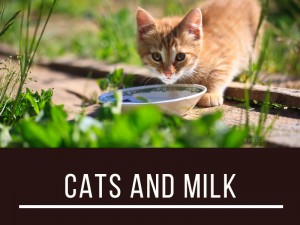
Cats and milk
Many cats seem to love drinking milk and will react very enthusiastically when their owners offer them that treat. However, what many cat owners are not aware is that milk might not be the best thing for your cat.
Cats only really need milk when they are very young. To digest lactose, the sugar in milk, cats need an enzyme called lactase and this enzyme's activity declines when cats grow up. After weaning, they gradually lose their ability to digest lactose, often becoming lactose intolerant.
For these cats this means that when they drink milk and the lactose in it reaches their intestines, it cannot pass through the intestinal wall into the bloodstream. The lactose will remain on the intestines, drawing water from the intestinal walls and cause the gut flora to become unbalanced. By this time fermentation sets in and large amounts of gas are produced. All of this causes abdominal pain, occasionally vomiting and diarrhoea.
Some cat owners often try to offer their cats goat's milk but it has just as much lactose as cow's milk, so it is very unlikely to be any better. Our recommendation for all cat owners is to stop giving milk to your cat, if he or she feels abdominal discomfort or gets diarrhoea. The truth is that cats only really need water and good quality food to be healthy.
If your cat really loves milk and you are reluctant to deprive him or her of that treat you can always buy "Cat Milk" (lactose-free milk) from pet food stores, vets or supermarkets, which is basically milk that had most of its lactose removed and is less likely to cause these harmful reactions.
Would you like to know more about cats? Check our Feline Courses:
Feline courses
Read the previous article: Health benefits of pet ownership


